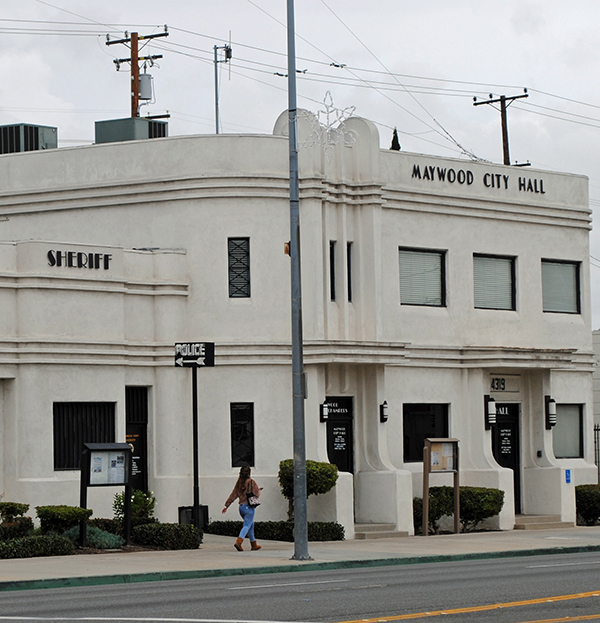By Alfredo Santana
Contributing Writer
MAYWOOD — The city is joining a growing list of area cities considering rent controls after it extended a temporary moratorium on rent increases through Sept. 28.
The City Council recently voted to allow staff more time to assemble a permanent proposal to cap yearly increments on rents, thus avoiding a temporary ordinance passed in March to lapse on June 8.
The measure follows an initial emergency order that froze rent increases initially for 60 days on Feb. 6.
Although it is unclear what tenant protections, and the rate of increases a rent stabilization program would bring, Maywood City Manager Jennifer Vasquez said staff is looking at various cities in Southern California that limited increases to an average of 4% a year.
“We are looking for direction so that we can continue the analysis and bring back if you so choose an ordinance to consider,” Vasquez told the City Council.
She cited Bell Gardens as a city that last year passed rent controls limiting rent increases at 4% a year, with a caveat allowing inflation below that mark to be the ruling rate.
Vasquez said municipalities have carved out properties built after Oct. 1, 1978, and single home units available in one lot from their measures to avoid conflict with state law.
Also, a potential rent stabilization law would have to address how just-cause evictions are defined and under what circumstances they apply, despite being already part of Assembly Bill 1482, also known as the Costa-Hawkins Rental Housing Act.
Councilman Heber Marquez asked to include in the policy language to prohibit harassment from landlords toward tenants and provide specified punishment for infractions.
Another criteria would require rental units to register with the city to have a better control of the housing stock in the event some are exempted from the ordinance.
Currently, apartment owners have to obtain business licenses to rent units. Also, the proposal would need to address if rent caps apply to rooms in motels and hotels where the same tenants are registered for 30 days or more.
A full cost analysis would include the city’s need to hire new personnel to oversee the program.
Councilman Eddie De La Riva asked staff to set up a page on the city’s website explaining rent control updates and exemptions spelled out in AB 1482. He expects to have a preliminary ordinance ready for discussion sometime this month.
De La Riva said he perceived a disconnect on what the City Council plans to do, particularly from out-of-town callers who chimed in with comments “not necessarily true.”
The comment was made after Max Sherman, a representative from the Apartment Association of Greater Los Angeles, blasted the rent stabilization pitch for potentially forcing mom and pop owners to flee and sell their properties to large corporate landlords.
“We had multiple conversations,” De La Riva said. “We are the ones who initiated putting this on the agenda to begin with.”
He called for a fair and enforceable “straight-forward policy” in light of inflation and rising fees from companies hauling trash passed onto the renters and for landlords who are diligent with property maintenance.
“I know other cities have made exemptions and their policies are very convoluted, so whatever we decide I hope we are able to come together on an agreement that is fair to both sides,” De la Riva said.
Carlos Cordova, a landlord who lives in neighboring Huntington Park, told the council he would support an ordinance not too punitive for small property owners, because people like him are not registered as real estate corporations controlling portfolios with apartments.
“As a property owner, I am in favor of rent controls as long as it’s an impartial contract that not only benefits the tenants, but also the landlords,” Torres said in Spanish. “It’s true that not all the landlords are bad, but neither all tenants are good.”
In case the city decides to form an ad-hoc committee to study the item, Torres suggested inviting renters and landlords to help balance proposals and protect both stakeholders.
Despite local support, pushback against both temporary freezes and a permanent rent control ordinance has been brewing for months.
Martin Marakyan, government affairs coordinator with the Apartment Association of Greater Los Angeles, criticized Maywood staff for the lack of evidence suggesting changes in rising rents are significant enough to justify urgency ordinances.
“Instead, it appears that the decision to bring forward this proposal as an urgency ordinance was merely an attempt to stifle opposition and severely limit public input,” Marakyan said in a statement posted on the association’s website.
Marakyan referred to a Feb. 6 meeting where Marquez and De La Riva “made only general remarks against rental housing providers without any specific facts or data to support them during the meeting.”
He said his group’s members would discuss with Maywood’s elected leaders why they think a permanent rent stabilization law is needed when solutions like direct rent subsidies from the city would work without “severely damaging rental housing providers.”
Marquez slammed that organization for citing data from CoStar on emails he received. CoStar is a company focusing on commercial real estate that he alleged does not apply to Maywood.
The U.S. Census Bureau reported Maywood had 24,122 residents in 2022. About three of four households are occupied by renters, and “though housing costs are moderate compared to the region as a whole, they are high compared to the city’s incomes,” according to a report prepared by Steve Fowler, director of building and planning.
The housing stock is composed of 6,768 units, with 3,686 built in parcels without any other attachments, according to Vasquez.
In June, neighboring Cudahy also approved its own rent control measure, capping increases at 3% a year, or at inflation below that mark.












